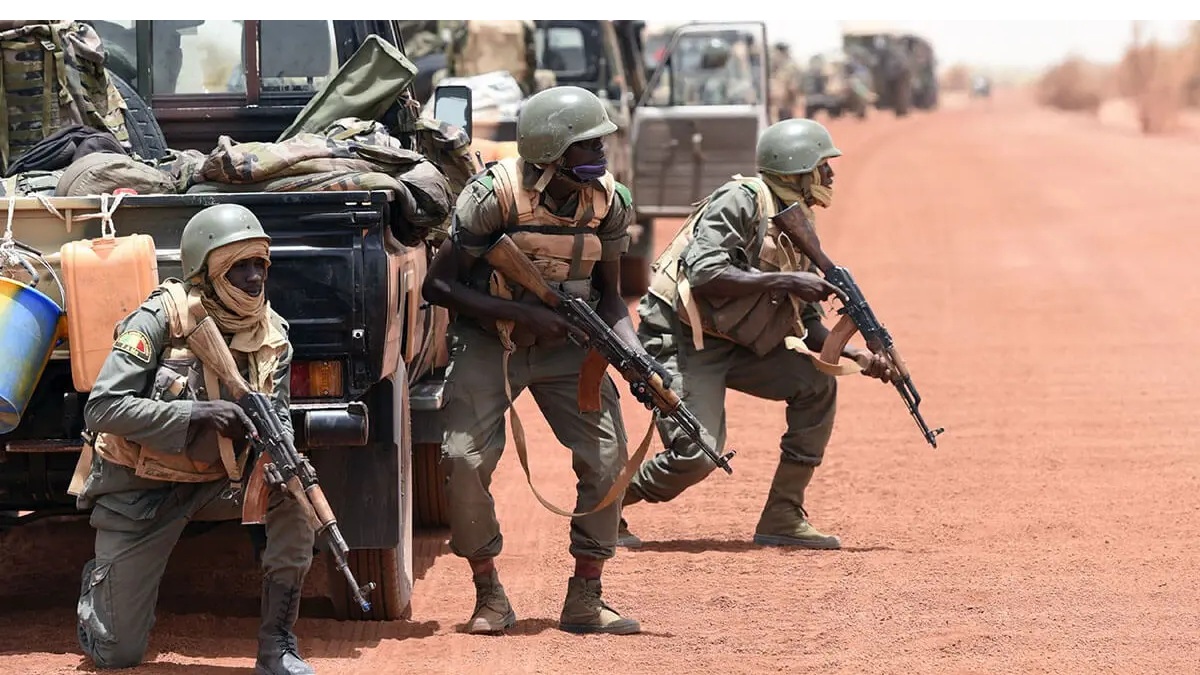In a disturbing development that underscores the ongoing instability in the Sahel region, jihadist fighters launched a series of coordinated attacks on multiple military posts across several towns in Mali on the morning of Tuesday, July 1, 2025.
This assault according to local media sources, marks the third major offensive against the Malian army within the past month,.
It highlights the persistent and intensifying threat posed by Islamist militant groups in the country.
The Latest Assault: Scale and Impact
According to Mali’s military, the attacks occurred simultaneously in at least seven towns and cities, including Binoli, Kayes, and Sandere near the Senegalese border, as well as locations further north close to Mauritania.
The army claimed to have repelled the attacks, stating that over 80 militants were “neutralised” during the confrontations.
While the military did not disclose information about casualties among its own forces, it confirmed the recovery of weapons, vehicles, and motorcycles from the assailants.
Despite these claims, Jama’at Nusrat al-Islam wal Muslimin (JNIM), an al-Qaeda-affiliated jihadist group that claimed responsibility for the attacks, asserted that it had seized control of three army barracks.
JNIM described the operation as “coordinated and high quality,” though it did not provide details on casualties or further strategic objectives.
Eyewitness accounts from towns like Kayes paint a vivid picture of the chaos unleashed by the attacks.
One resident told AFP news agency, “We woke up in shock this morning.
“There’s gunfire, and from my house I can see smoke billowing towards the governor’s residence.”
Such testimonies underscore the profound disruption and fear experienced by civilians caught in the crossfire.
Background: A Decade of Conflict and Instability
Mali has been grappling with a deadly Islamist insurgency for more than ten years, a conflict that has been compounded by separatist movements and ethnic tensions within the country.
The jihadist insurgency, largely driven by groups linked to al-Qaeda and the Islamic State, has exploited weak governance, porous borders, and socio-economic grievances to entrench itself in northern and central Mali.
JNIM, the group behind the latest attacks, is a coalition of several jihadist factions that merged in 2017.
It has been responsible for numerous high-profile attacks targeting Malian security forces, UN peacekeepers, and civilians.
The group’s activities have severely undermined Mali’s stability and contributed to a broader security crisis across the Sahel, a vast region spanning several countries in West and Central Africa.
Recent Attacks Signal Rising Insecurity
The recent wave of attacks is not isolated.
On June 2, militants targeted both an army camp and the airport in Timbuktu, a historic city in northern Mali.
Just one day prior, a separate raid in central Mali resulted in the deaths of at least 30 soldiers.
These incidents collectively highlight a worrying trend of escalating violence and the increasing operational capability of jihadist groups in the region.
Regional and International Concerns
The surge in attacks in Mali and the wider Sahel has drawn international attention and concern.
The United States Africa Command (Africom) has repeatedly warned about the growing influence and reach of Islamist militant groups in the Sahel.
In a May press conference, Africom Commander General Michael Langley described recent attacks across Nigeria, the Sahel, and the Lake Chad Basin as deeply troubling.
General Langley emphasized the strategic threat posed by militant groups gaining access to West Africa’s coastline.
Such access would enable these groups to expand their smuggling networks and arms trafficking operations, thereby enhancing their capacity to sustain and escalate violence.
This development poses a significant challenge not only to regional security but also to global efforts to combat terrorism and transnational crime.
The Human and Political Toll
Beyond the immediate military implications, the ongoing conflict in Mali has severe humanitarian consequences.
Civilians continue to bear the brunt of violence, displacement, and economic disruption.
The instability hampers development efforts and exacerbates poverty and social fragmentation.
Politically, the persistent insecurity has weakened the Malian government’s authority, leading to coups and political instability.
The inability to effectively counter the insurgency has also strained relations with international partners and complicated peacekeeping and stabilization missions.
Looking Ahead: Challenges and Prospects
The recent spate of attacks signals that Mali’s security situation remains precarious.
Addressing this complex crisis requires a multifaceted approach that combines military efforts with political dialogue, economic development, and regional cooperation.
Strengthening the capacity of Malian security forces, improving intelligence sharing, and addressing the root causes of radicalization are critical steps.
Equally important is the need for sustained international support, including from regional organizations like the African Union and economic communities such as ECOWAS.
Ultimately, restoring peace and stability in Mali and the Sahel will demand long-term commitment and coordinated action from national governments, regional actors, and the global community.
The resilience of the Malian people and the strategic importance of the region make this an imperative for international security and development.
This overview provides a comprehensive understanding of the recent jihadist attacks in Mali, their context, and broader implications for regional and global security.
The situation remains fluid, and ongoing monitoring is essential to grasp the evolving dynamics of this critical conflict.







